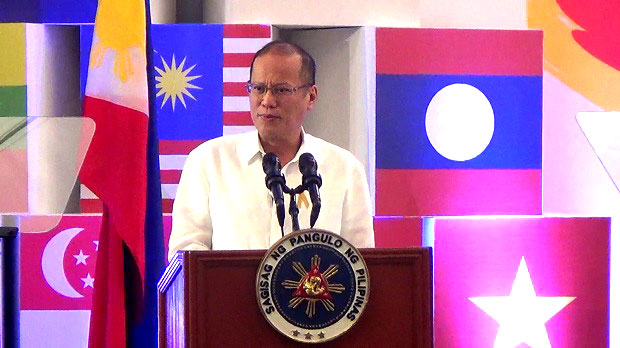
MANILA, Philippines–President Benigno Aquino III on Friday assured the business sector that the government is addressing concerns on energy and port congestion although both are still a work in progress.
“This is not the first time we have heard about these matters, and I can assure you that practically all aspects of your resolutions are already being addressed by government,” he said during the Philippine Chamber of Commerce and Industry’s (PCCI) 40th Philippine Business Conference (PBC) held at the Manila Hotel.
However, he said of the port congestion problem, “Some might say that we can cross that off the to-do list, but in reality, the situation is far more complex.”
After receiving a copy of the PBC’s resolution listing down the sector’s recommendations to boost the country’s competitiveness, Aquino said the government has already started working on some of issues.
“In communicating to us your concerns and advocacies, you are helping to pinpoint areas that can be improved, so that we can sooner achieve our goal of inclusive growth,” he said.
Energy investments
Aquino, however, admitted that an integrated and sustainable energy power development roadmap is still a “work in progress.”
He said the current power situation where energy supply is produced “just in time” should be changed.
“The work will be infinitely faster and more efficient with the cooperation of the business sector. There are around three major entities in power today who are putting their money where their mouth is and in their trust in the Filipino people, and are investing in the sector, even without long term power purchase agreements or power supply contracts,” the President said. “We hope that more investors will follow suit and will seek ways and means to encourage more in following their track.”
Port congestion
On the other hand, Aquino gave a rundown of the measures implemented to address the port congestion in Manila, which had spilled over and resulted in heavy traffic in the metropolis.
“The issue of port congestion has been a paramount concern since the truck ban; we know just how much it has affected, and can affect, the conduct of business in the country,” he admitted.
Aquino assured that local officials and Cabinet Secretary Rene Almendras are “working hard to address the issue.”
He said the government has already offered the Subic and Batangas ports as extensions of the port of Manila. To encourage more people to use these ports, the government has already lowered fees and costs.
“The Philippine National Police has likewise ramped up their operations against hijackers, to ensure the safe passage of cargo. On the ground, the police have intensified their presence along our roads and highways, especially in areas identified to be prone to hijacking and carnapping, and this has not been done just recently, but even as far back as about two years ago,” he added.
Aquino said there have already been improvements such as the 94 percent utilization of the Port of Batangas, a substantial increase from only 20 to 25 percent in the past.
The President, however, admitted that finding answers for the port congestion issue still cannot be crossed off his to-do list.
“Diverting traffic to Subic and Batangas is only a short-term solution; high utilization rates for both may mean that we run the risk of transferring the problem we encountered in the Port of Manila to those very ports,” he said, adding that weekend operations may be more effective.
“Data from the Philippine Ports Authority, however, show that there are very few individuals and organizations taking advantage of (the Bureau of Customs and port operators’ weekend operations). Only an average of 1,100 containers are moved on Sundays, which represent less than a third of the average number of containers moved on other days of the week,” he said.
The issue of port congestion is among the major issues the business sector is concerned with.
Aquino said government can come up with a solution through active participation of the private sector.
Competitive Philippines
Nevertheless, the President said the past four years have shown the results of the government’s “commitment to turn the tide” of the Philippine economy.
“The Philippines is ranked investment grade and continues to climb global competitiveness rankings. Our economy remains strong, with growth at 6.4 percent in the second quarter of this year. Even more good news, the first half of 2014 attracted net foreign direct investments of $3.57 billion, almost 80 percent higher than the FDI recorded in the same period in 2013. Manufacturing has rebounded, with 8.8 percent growth in the first half of 2014, and exports are up,” he said.
Aquino said his government is not only implementing measures as a reaction to pressing events.
“More importantly, we are strategizing for the future. In each and every endeavor, however, the private sector must likewise do its part,” he said.
He reminded the businessmen that the government wants them to succeed and create more job opportunities for Filipinos.
“Your growth redounds to increased livelihood opportunities for our people, which in turn redound to an empowered consumer base and a productive citizenry able to take part in spurring the growth of our economy and of our region,” he said.
RELATED STORIES
Aquino assigns Manila port extensions during emergency situations
Aquino: It’s more fun to do business in the Philippines

